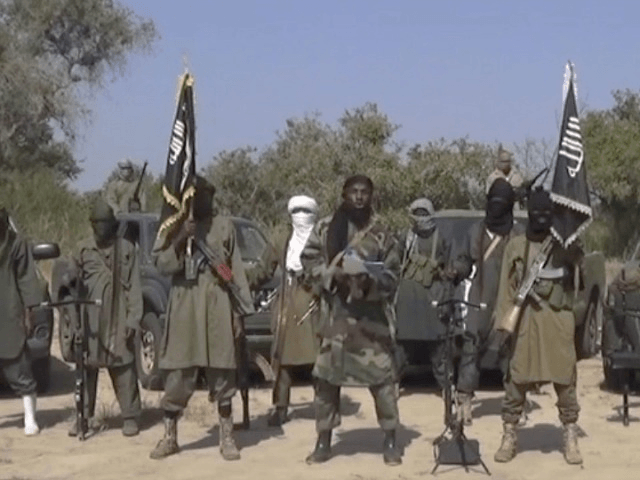Boko Haram terrorists entered the northeastern Nigerian village of Chibok, Borno, this weekend, burning down homes and looting food to sustain themselves according to locals.
Chibok became world-famous after the jihadist group raided the village in 2014 and abducted 276 schoolgirls from the local secondary school during an annual exam. Over 100 girls remain missing more than five years after the attack, and a significant percentage of those who survived were not rescued but escaped on their own.
The Nigerian government has repeatedly claimed it has defeated Boko Haram and that the group no longer exists. When confronted by repeated Boko Haram attacks and the fact that hundreds of people abducted by the terrorists are still missing, Abuja contends that the terrorists currently active are members of the Islamic State West Africa Province (ISWAP), an offshoot of the original Boko Haram.
Boko Haram pledged allegiance to the Islamic State in 2015.
The jihadist terrorists “sacked community members, destroyed and set houses on fire” in Chibok this weekend, according to Nigeria’s Vanguard newspaper. This Day, another newspaper, cited eyewitnesses who said the assault began late Saturday. Due to the remote location of many Boko Haram attacks, it often takes days for news of an attack to get to the general public.
“They came in this evening and started shooting sporadically. Most of the villagers have run into the bush,” an unnamed “source” told This Day. “We don’t know if there are casualty [sic] yet because right now the insurgents are still in charge of the village.”
“Reports coming from Yimirmugza, Kautikari in Chibok LGA indicates that houses were burnt, stores broken provisions looted, cars burnt and people injured,” Mallam Abga Pogu, an elder statesman in the village, told Vanguard. The newspaper noted that the terrorists did not appear to have injured anyone in the village as “most panicking residents have fled into the bush for safety.”
Borno is located in Nigeria’s northeast, near the dense and vast Sambisa Forest and consisting largely of undeveloped “bush” territory. Boko Haram was born in Borno’s capital, Maiduguri, and has historically taken advantage of the Sambisa Forest and difficult terrain to hide from police and the Nigerian military.
Chibok observed the fifth anniversary of the abduction of nearly 300 schoolgirls from the town in April. Current President Muhammadu Buhari, a Muslim ethnic Fulani from the country’s north, won the presidency in 2015, and re-election this year, largely by campaigning that his military dictator background could help eradicate the Boko Haram threat. In 2016, Buhari approved the trade of four senior Boko Haram jihadis for 21 Chibok girls, who the group released immediately. Some of the released terrorists have since returned to violence.
The trade did not stop Boko Haram terrorists from repeatedly attacking Chibok after the abductions.
Buhari began claiming that Nigeria “won the war” against Boko Haram in 2015, before he approved liberating multiple senior terrorists. A month before the 2016 Chibok raid, Nigerian military spokesman Col. Sani Usman told reporters, “We have come to the point that we can beat our chest and decisively say we have dealt with Boko Haram.”
Nigerian officials made similar statements every year of Buhari’s presidency and continue to do so today. In light of the extended Boko Haram onslaught in the northeast, however, officials have now begun claiming that Boko Haram no longer exists.
Nigerian Army chief of staff Tukur Buratai told reporters in June “that what is currently playing out in the North-east is the metamorphosis of ISWAP [Islamic State West Africa Province],” not the indigenous Boko Haram. ISWAP, Buratai asserted, was made up of foreign jihadists looking for a home for their activities.
“The position of the Nigerian government is that the Boko Haram terrorism has been degraded and defeated. The real Boko Haram we know is defeated,” Buhari spokesman Garba Shehu said in August. “What we have now is a mixture of remnants of the Boko Haram, fugitive criminals…[and jihadis in Northern Africa’s Maghreb reigon] together with West African terrorists bonding together.”
Shortly after this declaration, Boko Haram seized two more Borno towns and setting them on fire, gathering food and supplies to continue attacking the government.
Critics of the Buhari government have accused Abuja of worsening the jihadist onslaught by doing little to fight corruption in the military and contain the influence of jihadist groups.
“The security situation has even worsened if we look at the general overview. APC [Buhari’s party] came into power in 2015 with the promise that Boko Haram would be a forgone story. Today, it’s a different ball game,” Bitrus Pogu, the National Chairman of the Middle Belt Forum, said this week. Nigeria’s Middle Belt connects the Muslim north to the Christian south and as such is home to another jihadist conflict, the Fulani herdsmen campaign to eradicate Christian farmers.
“On and on we find Boko Haram running over our military formations, taking our military equipment away,” Pogu said. “I believe if the government has the will, these girls (Chibok) will be released. … We believe the government can do better, let’s forget about the politics and do what is needful.”
Boko Haram is believed to have killed at least 35,000 people in the past decade and used 3,500 children as child soldiers and suicide bombers.
Follow Frances Martel on Facebook and Twitter.

COMMENTS
Please let us know if you're having issues with commenting.